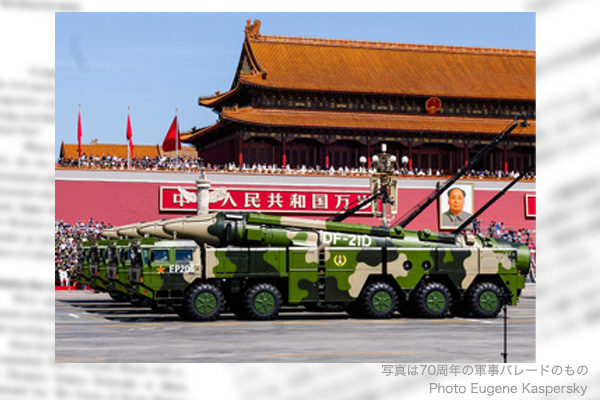In conjunction with a military parade on September 3, China, irrespective of historical facts, campaigned that it fought on the eastern front of the world anti-fascist war and that the Chinese Communist Party, which materialized the second united front with the Nationalist Party or Kuomintang through the 1936 Xi’an Incident, was the center of the war of resistance against Japan. The propaganda campaign is designed not only to increase the legitimacy of the CCP regime in the midst of economic downturn, but also to demonstrate the regime’s intention to fundamentally resolve Japan-China problems to China’s advantage and determine the international order in East Asia on its own terms.
Japan campaigned as an enemy of world peace
Regarding China’s territorial claim to Japan’s Senkaku Islands, Beijing has repeatedly claimed that Japan continues to illegally occupy the Diaoyu Islands, the Chinese name for the Senkaku Islands, which it considers part of Taiwan. According to Beijing, Taiwan returned to China under the international order established after World War II, which was fought as an anti-fascist war. Therefore, Japan is portrayed as an enemy of world peace that undermines the post-war international order.
Particularly in 2012, Beijing released a white paper on the Diaoyu Islands, which ignored the context of history books listed in the paper and claimed that China has controlled the islands since ancient times. The paper emphasized how China represents historical justice. In this way, the CCP has generally practiced the so-called discourse power to alter and manipulate historical facts to overwhelm public opinion.
Beijing has stuck to showing off its state-of-the-art military power on the occasion of the “80th anniversary of the victory in the war of resistance against Japan,” instead of the October 1 national foundation day, in an apparent bid to not only satisfy Chinese people and keep the United States and Taiwan in check, but also demonstrate its claims against Japan.
Based on articles in the Global Times, which is affiliated with the CCP’s official People’s Daily, and various Chinese online discourses (political statements that remain online are often seen as tacitly approved by the CCP), Beijing may be attempting to finally resolve the Taiwan issue and turn its confrontation with the United States to its advantage. This could involve pressuring Japan—seen as unrepentant on militarism and the Taiwan issue—into becoming anxious and submissive, abandoning the Senkaku Islands, and convincing the Japanese public that true prosperity and peace lie in sincerely embracing China’s development and accepting a China-centered order in the Western Pacific.
Japanese politicians should share a sense of crisis regarding China
In China under President Xi Jinping, the so-called Chinalization has forced to lead ethnic minorities and Hong Kong, which have not necessarily shared the CCP’s values over a long time, to believe that everything is built upon the blessings of Chinese civilization and the cooperation of the “Chinese national community,” with the CCP is at its core. People deemed to deviate from the belief have been severely punished and subjected to laogai prison labor.
Given this, it is undeniable that China may do the same thing against Japan as Russia, China’s cooperation partner “without limit,” has done against Ukraine and as China’s harsh politics against ethnic minorities and Hong Kong.
As the current political situation in Japan is extremely chaotic, it is necessary for Japanese politicians to widely share a sense of crisis across party lines over China’s idea of manipulating history to insult Japan’s peaceful development after the war and force Japan to submit. Ensuring Japan’s independence and freedom through cooperation with nations committed to preserving an open international order is an increasingly urgent task.
Satoshi Hirano is a professor of the University of Tokyo Graduate School.


